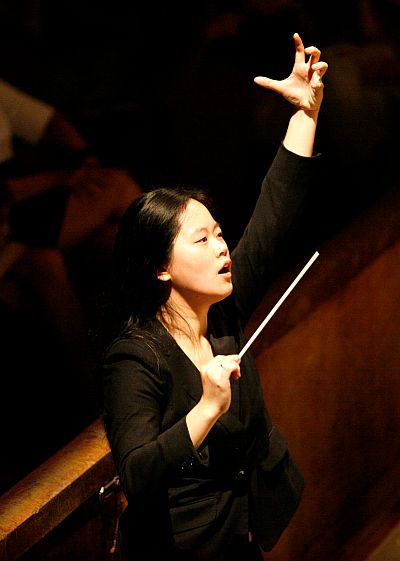 Italy ROF (1), Rossini, L’Ocasione fa il Ladro. Orchestra Sinfonica G Rossini. Conductor, Yi-Chen Lin. Staging, sets and costumes, Jean-Pierre Ponnelle, rerehearsed by Sonja Frisell. Teatro Rossini, Pesaro 15-08-2013 (JB)
Italy ROF (1), Rossini, L’Ocasione fa il Ladro. Orchestra Sinfonica G Rossini. Conductor, Yi-Chen Lin. Staging, sets and costumes, Jean-Pierre Ponnelle, rerehearsed by Sonja Frisell. Teatro Rossini, Pesaro 15-08-2013 (JB)

credits: studio amati bacciardi
Cast:
Don Eusebio –Giorgio Misseri
Berenice –Elena Tsallagova
Conte Alberto –Enea Scala
Don Parmenione – Roberto De Candia
Ernestina –Viktoria Yarovaya
Martino –Paolo Bordogna
Farce is the skill of handling tragedy playfully. It came into being only a few years after its more respectable sister –tragedy- with the plays of Aristophanes, who, wearying at his contemporaries’ nudging audiences towards judgements which they would be convinced they had made themselves, thought a lightness of touch, with moral judgement sent to the devil, might make for an excellent, alternative entertainment. Amazingly, all Aristophanes’ plots and ploys are still with us after two and a half centuries: the mistaken identity of persons or objects and false judgements based on inadequate information. An English translation of L’ Occasione fa il Ladro might be, Opportunity Makes the Thief, which hits the Aristophanian bulls eye rather more neatly than the original.
The art of farce is in making the absurd appear natural. Just think of the Chaplin silent movies. We become convinced that absurdity is not so extreme as we had thought. Assumptions are questioned. There is the pleasure of topsy-turvy Dom. And of course, matters need to proceed at a lively pace.
Not only is Yi-Chen Lin’s pacing vitally pointed, it has a champagne-like effervescence. Y’-Chen Lin was a violinist and pianist before she was a conductor. (I reported on the vitality of her ROF 2011 Viaggio Reims. ) Rossini’s violin parts strike terror in his players –all those semiquaver rushing passages which continually change direction! Ms Lin has drilled her violinists until they have grasped the relationship of each note to the rest and the bristling rhythm is so charged with electricity and the entire performance sits together with such ease as to make this difficult music sound easy. Moreover, this virtuosity also exudes a cheeky charm.
Rossini often uses the orchestra to make comments on the action –much like Wagner, though with greater wit and charm. A woodwind solo will often comment on a sung phrase –ironically if the sung comment has been serious or serious if the character has been ironic. Almost all Rossini conductors miss this wit. Not Yi-Chen Lin. Hers was the loudest and longest applause at the end of the show. The audience were entertained. The prime Rossini objective was achieved. And largely thanks to this twenty-three year old girl from Taiwan.
Jean-Pierre Ponnelle’s original 1996 production, sets and costumes, was first seen in the main hall of the Conservatory, where its workaday approach probably came off better than in the more elegant Teato Rossini. This year it was rehearsed by Sonja Frisell. Flats and costume movements are constructed before our eyes with choreographed mock stage-hands in braces: all with the studied air of one of the Girl Guides’ better theatrical efforts (though this doesn’t include the meticulously crafted costumes). The all-over audience reaction is, Well done, dears, with a condescending smile. But it speaks well for Ponnelle’s skill in that the smile and the condescension are both pre-ordered and charmingly manipulated by him.
Ponnelle keeps the show alive through elegance. He never descends into vulgarity –a vice all too common in farce. The plot is the usual Aristophanian nonsense: the two pairs of lovers swap partners –with a mistaken suitcase being responsible for starting the action (therein the “thief’s opportunity”) with some witty twists to make it all come “right” for the double wedding finale.
This is probably the moment to tell you about Daniel Smith, another rather interesting conductor at this year’s ROF. Like Ms Lin, he was making his debut conducting Il Viaggio a Reims with the young singers of the Accademia Rossini. (Sadly, nothing to report on there.) Young Mr Smith is Australian as every beat of his baton tells you: irrefutably decisive, which despite some rough and tumble, brings Rossini brio to life. For the moment, he lacks the precision and refinement of Ms Lin, but with all that convincing brio, I’m sure Rossini would applaud him. So do I. Watch this name.
Paolo Bordogna (Martino) is a fine basso buffo in both voice and movement. His aria –Il mio padrone è un uomo– won a deserved ovation. Both pairs of lovers –Elena Tsallagova (Berenice) and Enea Scala (Count Alberto) were in character, with Tsallagova more comfortable with coloratura than the expressive line and Scala the opposite with better bel canto than agilità. Roberto De Candia (Don Parmenione) I a fine singer / actor, especially in his opening aria –Che sorte, che accidenti, while Viktoria Yarovaya made the most of the fairly thankless part of Ernestina.
There was beautifully balanced singing in the Quintet and again in the finale –also thanks again to Yi.Chen Lin’s brisk pacing.
Jack Buckley